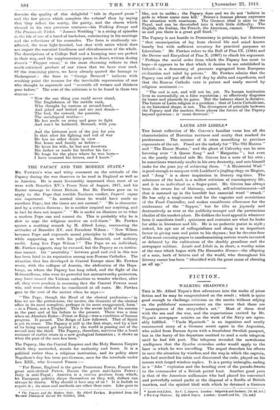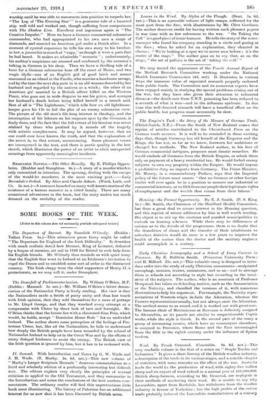FICTION.
WALKING SHADOWS-t
This is Mr. Alfred Noyes's first adventure into the realm of prose fiction and he may be congratulated on the result ; which is quite good enough to challenge criticism on the merits without relying on the publishers' announcement on the cover that these are "masterpieces of the storyteller's art." Most of them deal with the sea and the war, and the expectations excited by Mr. Noyes's newspaper articles on the work of the Navy are agree- ably fulfilled. "Uncle Hyacinth" is an ingenious and neatly constructed story of a German secret agent in the Argentine, who sailed from Buenos Ayres with a fraudulent Swedish passport-4 but in the hurry of his departure omitted to read a code telegram until he had left port. The telegram revealed the unwelcome ntelligence that the Spurlos versenken order would apply to the liner in which he was travelling. The sequel describes his efforts to save the situation by wireless, and the way in which the captain, who had searched his cabin and discovered the code, played on his terrors with forged wireless replies. It is a pretty imbroglio, ending in a " fake " explosion and the handing over of the pseudo-Swede to the commander of a British patrol boat. Another good yarn is that of the American millionaire Who had placed his converted and powerfully armed yacht at the disposal of a flotilla of British trawlers, and the spirited bluff with which he detained a German • • Lauds and Lads. By C. L. Graves. London : SidgwIck and Jackson. (Rs. fIcl. net! 1 Wa'Ling Shadows, By Alfred Noyes. London ; Cassell and CO. 17s. net.1 warship until he was able to manceuvre into position to torpedo her. "The Log of 'The Evening Star" " is a gruesome tale of a haunted ship well told and worked oat, though suffering from comparisons with The Shadow Line. Excellent and ingenious again is" The Creative Impulse." Here we have a German commercial submarine commander, who had appropriated to his own uses a cargo of diamonds, and married an American girl under a Dutch alias. In a moment of cynical expansion he tells his own story to his brother- in-law, a journalist in search of "copy," as though it were a yarn that he had heard. It makes an admirable " scenario " ; unfortunately. his auditor's suspicions are aroused and confirmed by the narrator's talking in German in his sleep. Then we have a thrilling tale of a hunt for a German submarine base off the coast of Maine, and two tragic idylls—one of an English girl of good birth and means marooned on an island in the Pacific, who marries a handsome savage, and by the time the next ship puts in is an old woman deserted by her hesband and regarded by the natives as a witch ; the other of an American girl married to a British officer killed on the Western Front, who goes out in male disguise to see his grave, and avenges her husband's death before being killed herself in a trench raid. Best of all is "The Lighthouse," which tells how an old lighthouse- keeper gave his 1:fe to foil the plot of an enemy submarine crew. The picture of the old man's life-long interest in theology, and the interruption of his labours on his magnum opus by the Germans, is finely done, and the fact that the full extent of his heroism was never realized by those who profited by it rounds off the tragedy with artistic completeness. It may be argued, however, that no one could ever have known the truth, and that the explanation of the secret is, to that extent, unconvincing. Some pleasant verses are interspersed in the text, and there is poetic quality in the last sketch, which illustrates the power of an artist to elicit unexpected meanings from apparently meaningless incidents.



































 Previous page
Previous page